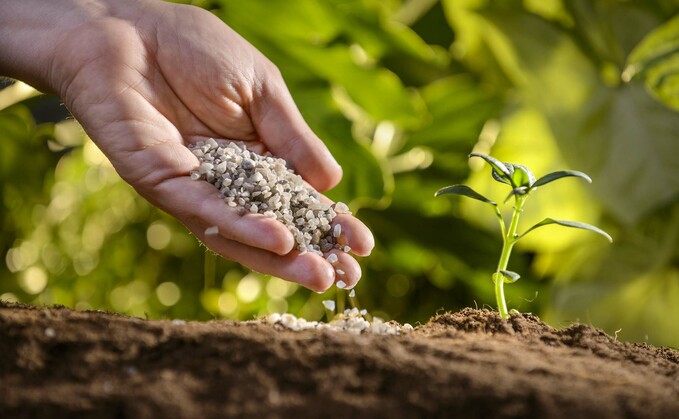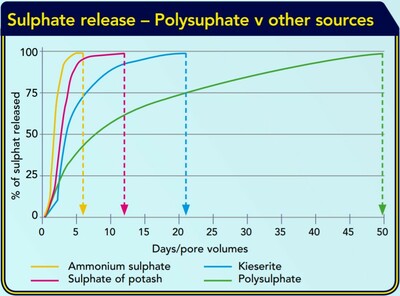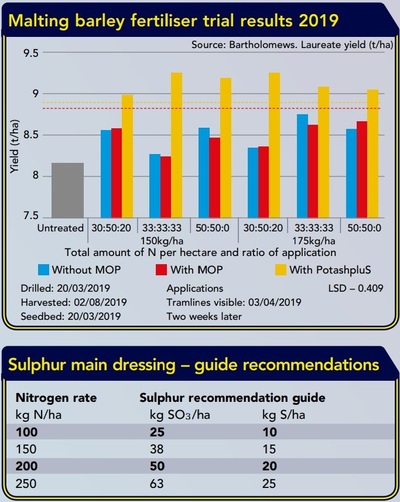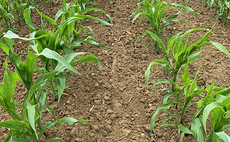
Adopting a balanced and targeted approach to crop nutrition is key to enhancing crop performance. Mollie Leach explores how ICL's Innovative Ag Solutions (IAS) new multi-nutrient fertilisers could benefit UK growers.
Cutting edge plant nutrition delivery is at the heart of the development of ICL's new IAS division, which has seen the business, formerly trading in the UK under the name Cleveland Potash Limited, dedicate itself to providing growers with high-performance plant nutrition solutions.
Endeavouring to help growers target their crop nutrition choices to meet their crops' needs precisely, ICL has developed a new multi-nutrient Polysulphate (polyhalite) fertiliser, which is organically approved by the Soil Association and organic farmers and growers. Polysulphate is sold under the IAS product range and is produced exclusively in the UK at the ICL Boulby mine.
With a higher sulphur content of 48% (SO3) and the additional benefits of potassium (14%), magnesium (6%) and calcium (17%) all in sulphate form, Polysulphate provides prolonged nutrient release, which optimises crop growth across all UK crops, says Howard Clark, Innovative Agricultural Solutions (IAS) Business Lead.
"Both a granular and powder product, the use of Polysulphate reduces the risk of sulphate loss through leaching due to its prolonged nutrient release pattern, which means that all nutrients are available for plant uptake during the growth period.
"Not only do plants have specialist needs for nutrients, they also require delivery with perfect timing, and the use of Polysulphate ensures the release pattern of sulphate matches the demand of the crop."
A recent release rate trial using soil columns indicated the prolonged release characteristics of Polysulphate.
The chart illustrates sulphate from Polysulphate was released for crop uptake into the upper soil horizon for about 50 days, in comparison to the other sulphate-based fertilisers, which had a significantly shorter release rate (see graph, left).
ICL says this positions Polysulphate as a ‘valuable' tool in helping growers achieve targeted plant nutrition solutions.
Application
ICL UK agronomist Scott Garnett highlights the ‘particular strength' of Polysulphate is that it can be recommended as a single early dressing at the beginning of spring growth in cereal crops.
"The fertiliser can be applied without causing a sudden high concentration of sulphate in the soil and causes minimum loss through leaching.
"And where nitrogen rates are varied, the dressing can also be independently varied to best match overall nitrogen applications.
"This means Polysulphate is an excellent source of sulphate for multiple dressings of fertilisers over the season," Mr Garnett adds.
This balanced and targeted approach to crop nutrition therefore helps to increase nitrogen use efficiency, says Mr Clark.
"Polysulphate, in the 2-4mm granular form, is the ideal fertiliser to apply alongside straight nitrogen and has excellent spreading characteristics.
"If the grower was to buy Polysulphate and apply it to his crop of wheat or barley, for example, with straight nitrogen, they can specifically target their nitrogen application and also fine-tune their sulphur and potassium application from the Polysulphate.
"Through decoupling nitrogen and sulphur, it gives the grower more flexibility to apply the nutrients they need, as and when they need them."
Targeted
Calls from the industry also saw a demand for targeted potassium application, in particular, alongside sulphur, in order to help growers optimise crop growth and boost yields.
Committed to working from the ground up to extend high-performance plant nutrition solutions for growers, this demand saw ICL develop PotashpluS fertiliser as part of its IAS product range, also produced at the Boulby mine, located in the UK.
A compacted 50:50 Polysulphate (polyhalite) and potash - potassium chloride (MOP) - fertiliser, the compound has a potassium content of 37% and a sulphur content of 23%.
"While primarily a potash and sulphate fertiliser, PotashpluS contains essential magnesium and calcium, and supplies all potassium and sulphur crop requirements in a single application," says Mr Garnett.
The high S content, combined with the addition of Polysulphate technology, ensures a ‘continual supply' of S throughout the crop cycle and reduces the risk of S leaching into sandy soils, especially under high levels of precipitation, Mr Garnett adds.
According to data collected by ICL in collaboration with Bartholomews, which investigated the use of PotashpluS as an alternative potassium source on three malting barley varieties, PotashpluS (including Polysulphate) improved the performance of nitrogen use efficiency in the crop significantly (see graph, above).
"Looking specifically at Laureate in yield, we can see that growers were able to apply less nitrogen and still achieve quality yields to ensure adequate profit by using polyhalite products such as PotashpluS, as opposed to applying MOP alone or no MOP," Mr Garnett says.
The creation of IAS has been integral to streamlining ICL's goal to help growers achieve balanced and targeted crop nutrition delivery with high-quality plant nutrition solutions, Mr Clark concludes.
"The IAS division has brought all of ICL's agricultural fertiliser inputs into one organisation.
"We have therefore been able to combine products sold as part of the speciality agricultural sector with the traditional potash and phosphate businesses, which also include our granular potash [GMOP] and triple super phosphate [GTSP] fertiliser products, under one umbrella.
"This means ICL is now able to offer every grower in the country a tailored solution to their crops' nutritional needs."
























